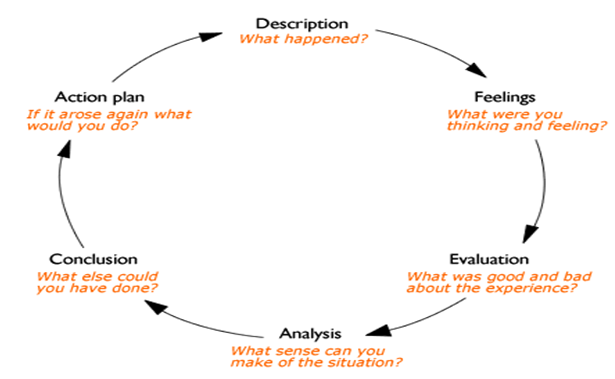- Case StudyHelp.com
- Sample Questions
Assessment B: The Reflective Essay
Session will cover
- Defining reflection
- Why should we reflect?
- Reflecting in professional practice
- Developing reflective “insights.”
- The role of theory/ models in reflecting (Gibbs model)
- Writing your reflective essay
Defining reflection
- In general, reflective practice is understood as the process of learning through and from experience towards gaining new insights of self and/or practice (Finlay, 2008)
- This often involves examining assumptions of everyday practice, also involves the individual in being self-aware and critically evaluating own responses to situations
Why should we reflect?
- To learn from our past experiences
- We develop a questioning attitude towards the way we do things while gaining new perspectives
- We identify areas requiring change and improvement
- We can potentially respond effectively to new challenges
- Most crucially in our areas of professional practice, it is the bedrock of personal and professional development
Developing Your Reflective “Insights.”
- Stand back from the events and be as objective as possible
- Be critical of your own actions
- Think of alternative explanations of events
- Make use of evidence from a range of sources (literature: models/ theories)
Reflective questions you must ask yourself:
- Why did I do things this way?
- What was I thinking and feeling, what was happening around me (recognize that you don’t live in a shell)! How did this influence me, and why?
- What else could I have done?
- What would I do in a similar situation?
Using Models/ theories to aid our reflection
Academic models provide a generalized framework to help with making sense of and understanding our experience(s)
Is there a universal gold standard fit?
- “Let us not forget that a model is a tool, not a mirror.” (Gordon, 1984 in Finlay 2008: 7)
Using Theory/Models to reflect
- Academic models provide a generalized framework to help with understanding what might have happened
- Models give you a structure to compare your experiences & language to help you explain how events unraveled
- However, these experiences are usually richer and complex than abstract models. Hence your experiences will not always fit into a ‘straight jacket’ (i.e. the model)
- While comparing your experiences to models/ theories can help you develop some insightful explanations for what happened, you should always be critical of the models!! (Consider what fits & what doesn’t; ask yourself “is there an alternative way of exploring and reflecting?”)
Gibbs (1988) Model of Reflection
Writing your Reflective Essay
- You could use Gibbs (1988) reflective model (and other models) as a guide to writing your reflective essay
- Gibbs reflective model potentially encourages you to think systematically about the phases of experience & you can use the headings to structure your reflection
- It is important to use theories/ models and includes in-text references
Using Gibbs Model of Reflection
- Description – begin by explaining what you are reflecting on to the reader; including background information [i.e. describe your learning experience on the module about a specific issue from module content. Describe your initial response to the issue (from memory, or from your diary/module notes).
- Feelings – you move on to discussing how you initially felt when introduced to the issue [Give your initial response. How did you feel during this time? Did you have strong feelings, or were you unsure? Etc.]
- Evaluation – discuss how well you think things went as the module progressed, in terms of your learning about ways to approach the issue (academically and for your future professional practice). Did you begin to see it in a different way than at the start? etc. (Gibbs, 1988)
- Analysis –Consider significant factors in your experience of learning about ways to approach the issue, showing why they are important in deepening your understanding (use literature sources)
- Conclusion – Acknowledge whether you could have done anything else to deepen your learning re the issue; what you have learnt from the experience of studying about it? Consider whether you could you have done things differently
- If your learning experience was positive, discuss whether you would do the same again to ensure a positive outcome ; if negative, discuss how you could have avoided it happening and also how can make sure it doesn’t happen again
- Action plan – this sums up what you need to do to improve next time.
- Outline the changes in your understanding and/or behaviour as a result of your learning experience about the issue, and your reflection upon it.(Gibbs,1988).
Issues from the module you may choose to reflect on:
- Service user/ patient discrimination (By age, sex, gender, sexual orientation, race etc. ) in professional contexts
- Service user/ patient abuse in professional contexts
- Health and Safety (staff, service users, patients etc.) In professional contexts)
- Violation of rights, e.g. Health care rights, Family life etc. in professional contexts
- Violation of the 4 ethical principles approach (respect for individual autonomy, social justice, doing no harm- non-malfeasance & doing good- beneficence) in Professional Contexts
Assessment B: Using Gibbs Model of Reflection
1. Report (description & Feelings) an issue and explain why it is important to your professional practice. Give your initial response to the issue.
Recount the issue on which you have chosen to reflect. Explain it and its context. Your initial response to the issue can show where you stood before you started to analyse the situation. What were your initial feelings about it?
2. Relate the issue to your own skills, professional experience or discipline knowledge.
Describe any similar or related experiences you’ve had and whether the conditions were the same or different. Make connections between this and your previous knowledge and experience of similar situations. Discuss how well you think things went in terms of what you learnt. What was good and bad about the learning experience?
Assessment B: Using Gibbs Model of Reflection
3. Reason about (discuss/ analyse) the issue to show an understanding of how things work in this discipline or professional field.
You should highlight significant factors in the experience showing why they are important for a new understanding. Relate these back to the academic literature including theoretical or research-based literature as appropriate. Use qualitative and/or quantitative evidence where appropriate. Discuss different perspectives involved, e.g. ethical, social, legal, organisational, and professional.
4. Reconstruct your understanding of future practice (Conclusion & Action Plan)
Outline the changes in your understanding and/or behaviour as a result of your learning about the issue and your reflection upon it. Explain the implications for this in your future professional practice. What actions will you take and why?
References
- Finlay, L. (2008): Reflecting on ‘Reflective practice’. PBPL paper 52. Open University
- Gibbs, G. (1988) Learning by doing: a guide to teaching and learning methods. Oxford: Further Education Unit.
- Larrivee, B. (2000) Transforming teaching practice: becoming the critically reflective teacher, Reflective Practice, 1(3), 293-307.
- Smyth, J. (1992). Teachers’ work and the politics of reflection. American Educational Research Journal, 29, 267-300.




